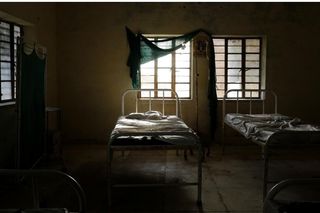
India’s Public Health Care System Is Overburdened, Undermined by Its Fossil Fuel Dependency
It’s a bad look on the cusp of a coronavirus epidemic and spells trouble for a future of worsening climate change.

The total number of global coronavirus cases crossed 95,000, with India hitting 31 on Friday, mostly in the north of the country. Originating in Wuhan, China, the surge in COVID-19 to more than 80 countries has been unprecedented in the modern era – and is likely only to worsen. The Health Minister, Harsh Vardhan, has issued a number of statements asserting that India is preparing a “containment plan” and focusing on its “core capacities for disease response.”
What does that really mean? India’s public health system is still reeling from extreme weather catastrophes in the last three years, with the massive private sector rarely stepping in to assist in such inherently unprofitable ventures. The disaster management systems in Odisha after Cyclone Fani hit in May 2019 were effective in evacuating more than 1 million people and providing them with pre-emptive medication, but to date, most of them remain homeless without any financial respite. They still don’t have access to affordable healthcare for the plethora of diseases that developed in the storm’s aftermath. Similarly, even though Kerala’s state government was widely praised for its swift relief efforts after the severe 2018 floods, the damage to the area’s cash crops, agricultural resources, and clean drinking water was never fully addressed, leaving people — particularly those from lower-income communities — in chaos.
Now, at a time when both pandemics and extreme weather events are expected to get a lot more frequent, India must face a long-overdue question: is our public health infrastructure strong enough to withstand long-term damage from the escalating threat of climate change?
Not if it continues to rely on fossil fuels.
“India is one of the most vulnerable countries in the world to climate change. Almost 70% of Indians come from the rural, agricultural sector, a sector that is highly dependent on favorable weather and climate. Changes arising from global warming will significantly affect their lives and livelihoods,” says Padmini Gopal, a climate policy researcher based in New Delhi.
Related on The Swaddle:
Indian Children Will Face Lifelong Health Issues Due to Climate Change, Says Lancet Report
Even though climate change routinely affects every sector of the Indian economy – including healthcare, where it has perhaps the most tangible effects – there is a tendency to view it in isolation from other public issues; the emphasis is always on individual responsibility to slow down climate change. Schools talk about “natural disasters” without addressing the anthropogenic forces that lead to them, just as mainstream media outlets glorify stories from brave volunteers and hardworking NGOs as the way to combat climate tragedies. The National Health Portal — a resource administered by the Indian government — issued a long, detailed report last year discussing the impacts of global climate change on health, but the only solutions it offered involved “acting quickly and making changes to our lifestyle.”
The truth is simply that we have passed the point where reusable straws and refillable water bottles will save the planet. This is not to discourage individuals from leading more sustainable and healthier lives, but rather to realize that most ‘solutions’ to climate problems lie in massively reforming the larger structures of governance and power that contribute to them.
“To combat this health crisis, it is vital that those in positions of power understand the interconnected risks associated with a rapidly changing climate,” writes Marcus Arcanjo, a fellow at the Climate Institute in Washington D.C, a non-profit promoting global climate mitigation/adaptation strategies by focusing on vulnerable populations and human health. “National ambitions for health, economic growth, and environmental sustainability should be designed to complement one another, not as individual goals.”
In India, these goals are far from interlinked. A look at how the government allocates public funds — particularly the money spent on subsidies — is telling of how low a priority both climate change and public health truly are.
The majority of healthcare in India is shouldered by the private sector, with the government encouraging private expansion into what is a very profitable industry. The World Bank found that government health expenditure as a proportion of GDP was just 1% in 2015, whereas the out-of-pocket expenses incurred by patients (or their private insurance companies) as a proportion of overall health expenditure was more than 65%. In other words, the more the private sector generates profit, the more it increases tax revenue for the government. This ‘success’ enables the government to spend less on subsidies for public healthcare, which more than 20% of the country’s population still depends on, especially those living in poverty and/or in rural areas, particularly during public health emergencies.
Instead, the majority of government funds go towards fossil fuel subsidies. In 2016, that amounted to nearly INR 60,000 crore (US$ 8.3 billion) — a staggering amount of money spent entirely on harvesting coal, oil, and gas. Unfortunately, India’s electricity and power sector is dominated by coal, one of the most harmful pollutants in the world, responsible for more air pollution than any other fossil fuel. Most other service sectors – including healthcare — rely on this coal-based energy to function, which is one of the reasons why the government continues to subsidize it heavily. While the subsidies given to renewable energy have increased significantly in recent years, it will take several decades before solar and wind power can meet the demand for energy within the Indian economy.
Related on The Swaddle:
Report: More People Died Due to Climate Change in India Than Anywhere Else in the World in 2018
Fossil fuel subsidies are further complicated by the fact that across India, fossil fuels and biomass-based energy are responsible for the majority of air pollution. Not only do they primarily affect the health of poor women and children — who often stay at home preparing meals using wood-burning stoves — but the health cost of this pollution is estimated to be 3% of India’s total GDP.
In 2013, the Health and Environment Alliance (HEAL), a European non-profit that addresses how the environment affects global health, issued a report titled “Hidden Price Tags,” which assessed how much countries spent on fossil fuel subsidies as compared to the health costs associated with them. India had spent US$ 16.9 billion on oil, gas and coal subsidies that year, but the cost of mitigating air pollution-linked diseases was eight times higher, at US$ 140.7 billion. Even today, with the money spent annually on fossil fuel subsidies, India could provide 375 million households with solar lamps.
Not only does the HEAL report advocate for a strategic reallocation of subsidy funds, but it also challenges countries to design a long-term solution with fiscally viable, renewable energy at its core. Public health infrastructure in India is able to exist because of the same fossil fuels that overburden it — a conflict of interest that helps only to line pockets of the rich. India made big promises to tackle climate change in the Paris climate conference of 2015 and continues to have ambitious plans for investing in renewable energy. However, these goals need to be integrated with plans for health, development and economic growth in a long-term, sustainable way that doesn’t put the onus on the average citizen and doesn’t allow the private sector to shirk its responsibility.
“A lot of conflict, inadequate health infrastructure, poverty, and inequality stems from our indiscriminate misuse of fossil fuels. India has the capacity to tackle climate change systematically, the biggest challenge is political will and behavioral change,” adds Gopal. “Conversations about climate change and public health management should not enter public discourse only on the brink of catastrophe. Let’s hold governments and corporations accountable while we can.”
Paroma Soni is a data journalist and videographer from Mumbai currently based in New York. Her work focuses on politics, human rights, gender, and culture. You can find her on social media at @paromasoni.
Related


BPA‑Free Plastic Isn’t as Safe as We’ve Been Sold
